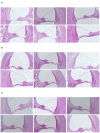Effects of Glucocorticoids on the Inner Ear
- PMID: 33505985
- PMCID: PMC7831029
- DOI: 10.3389/fsurg.2020.596383
Effects of Glucocorticoids on the Inner Ear
Abstract
Hypothesis: Recently, several lines of evidence have suggested that the inner ear is under hormonal control. It is likely that steroids have some influence on the inner ear. Background: Many clinicians have been empirically using steroids for the treatment of diseases associated with endolymphatic hydrops. The theoretical grounds for this are not clear, and there have been a number of debates on the effectiveness of steroid treatment. Furthermore, there are few reports on histological observations of the influences of steroids on the cochlea. Method: Fifteen guinea pigs (30 ears) were divided into three groups. In the control group, physiological saline solution was administered intra-peritoneally for 3 days. In two steroid groups, 40 mg/kg/day of hydrocortisone or 4 mg/kg/day of dexamethasone was administered intra-peritoneally for 3 days. Extension of Reissner's membrane and volume change of the scala media were checked 6 h after the last administration. The degree of Reissner's membrane extension and volumetric change of the scala media were quantitatively measured with the use of a video-digitizer. Results: We did not identify any distinct changes in the cochlea of the control group. In contrast, the extension of Reissner's membrane and endolymphatic hydrops were observed in the animals in the steroid groups. Statistical analysis revealed that Reissner's membrane extended significantly in the steroid groups, and that the volume of the scala media also increased significantly. Conclusion: This is the first report to investigate the effects of systemic administration of glucocorticoids on guineapig cochlea. The extension of Reissner's membrane and dilated endolymphatic space were evident in the steroid groups. However, the underlying mechanism of histological changes was not clear, marked care needs to be taken when administering steroids to patients with Meniere's disease whose histological feature is endolymphatic hydrops.
Keywords: Meniere's disease; dexamehtasone; endolymphatic hydrops (EH); hydrocortisone; steroid therapy; sudden deafness.
Copyright © 2021 Takeda, Takeda and Kakigi.
Conflict of interest statement
The authors declare that the research was conducted in the absence of any commercial or financial relationships that could be construed as a potential conflict of interest.
Figures


References
-
- Hauser E. Meniere's disease; a new therapeutic approach. J Am Geriatr Soc. (1959) 7:874–6. 10.1111/j.1532-5415.1959.tb00357.x - DOI
-
- Taillens JP. Cortisone in clinical otorhino-laryngology. Adv Otorhinolaryngol. (1968) 15:32–63. 10.1159/000385358 - DOI
-
- Beck C. “Controversial aspects of Meniere's disease” in ed C. R. Pfaltz Georg Thieme Verlag Stuttgart and Thieme Inc. (1986).
LinkOut - more resources
Full Text Sources
Other Literature Sources

